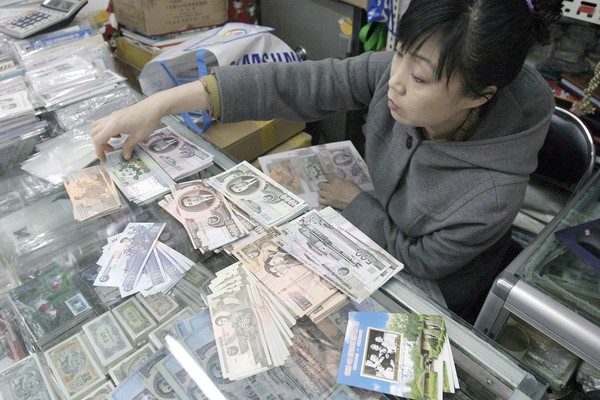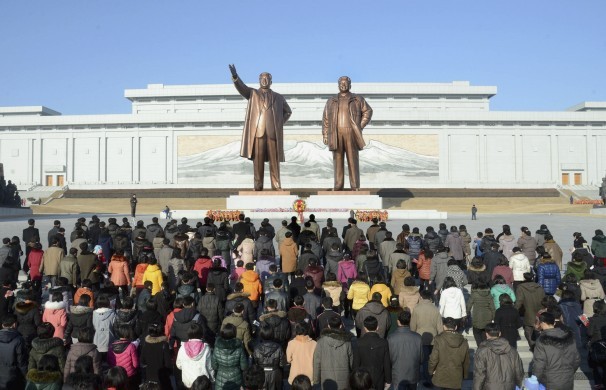
The textile factories making “Made in China” goods from compounds throughout the Yalu River in North Korea offer a peek into a hidden world that’s helping North Korea’s market to prosper.
Managed by North Koreans, the factories make clothing and other goods which are exported under foreign-business labels, which makes it impossible to tell they’ve been made with North Korean hands and have led to North Korean gains.
A lot of that increase comes from middlemen helping them cover their trails through Dandong, a hive of North Korean and Chinese managers and dealers.
One local Chinese businessman estimates that one quarter of the population, in the city of 800,000, is called for in doing business with North Korea in some way.
Under fluorescent strip lights, dozens of North Korean girls sat in a single factory sewing seams and pressing pockets on trousers, some of which were destined for America.
The extensive variety of commercial activity indicates that it’d be erroneous to believe China’s leaders are currently annoyed with Kim Jong Un, who took control of North Korea at the end of 2011 after the passing of his dad and is tightening the economic screws on the youthful leader next door.
Doing business with North Korea is an extremely sensitive issue for China, so much so that during a week of coverage along the North Korean border, local authorities tracked Washington Post reporters closely just to find out what they were up to.
North Korea is believed to have at least 50,000 workers outside the state bringing in cash for the regime and 13,000 of them work in Dandong.
These days, the most popular things to sell in North Korea are TV sets configured with USB ports for viewing videos that have been smuggled.
Reports from inside North Korea indicate that state-run firms are increasingly managed according to market principles, with supervisors empowered to hire and fire workers – formerly unthinkable in the communist nation – and conduct business how they see fit.
Beijing is certainly none too happy about this and smaller Chinese operators also have gripes about coping with North Korea.
“Occasionally a North Korean takes the cash, but afterwards you can not locate the man,” one operator said. They used to export kitchen goods to North Korea but have quit, saying it was difficult to make money there.
When inquiring if they’d seen indications that North Korea is opening up its market, a girl said, “Oh, you are so innocent!” “I haven’t seen any indications of that,” her husband chimed in. “We constructed this entire new bridge, but North Korea has not built anything.”
Get a Korean Chinese retailer who runs one of the 30 or so Chinese businesses in Dandong that boat material to North Korea to be turned into clothing there for European firms, Zhang.
North Koreans are especially great at painstaking, manual work like lace making and hand-stitched beadwork.
He reveals a picture of a blonde girl wearing an intricately embroidered pink and white dress, a product of North Korean labour and pulls out his smartphone.
Zhang, who speaks Chinese and Korean, doesn’t even want his passport.
“Over recent years, I Have established trust with the North Koreans,” he said.
I pay my regards to the leaders, and I am certain my customers report this back to the authorities.” Transferring cash For North Koreans who make money on the Chinese side of the edge, one question is the best way to get it back to Pyongyang.
Since the beginning of the Korean War in 1950, when it included North Korea in the Trading With the Enemy Act, America has sought to limit the capability of North Korea to commerce and bank.
“I am only a local businessman,” Zhang said, adding that sanctions “Use to large, international businesses, not to private people like us,” definitely considering his company with North Korea national.
“Anyhow, we find methods to get around them.” North Koreans are especially great at painstaking, manual work like lace making and hand stitched beadwork.
The North Korean businessmen who spoke to The Post said they purchase goods according to orders from Pyongyang and send back those instead. Lately, they’ve been asked to send back generators and solar panels to help deal with North Korea’s long-term electricity deficit.
“There is plenty of jumping to conclusions in Washington and discussion about China revealing a solid hand to North Korea,” said John Park, a North Korea sanctions specialist at MIT.
“I do not see the signs for that.” Although commerce seems to have dipped lately, this is caused by sharp declines in costs of commodities like coal and iron ore – two of North Korea’s largest exports to China – rather than some sort of punishment for Kim’s dearth of deference to Xi Jinping, the Chinese president.
The youthful North Korean leader hasn’t made the standard pilgrimage to go to the patron in the state.
Danger unsettling and Park said, doesn’t need North Korea becoming shaky this volatile northeastern area of China.
“As you have to have saw tons of historical soap operas in South Korea, you’ll understand that China and North Korea are like lips and teeth,” said the North Korean factory supervisor over dinner, repeating an old expression about the neighbors.
“North Korea’s Growing Economy – and America’s Misconceptions about It.” Washington Post. The Washington Post, n.d. Web. 19 Mar. 2015. <http://www.washingtonpost.com/world/asia_pacific/north-koreas-growing-economy-and-americas-misconceptions-about-it/2015/03/13/b551d2d0-c1a8-11e4-a188-8e4971d37a8d_story.html>.






English, Do you speak it?